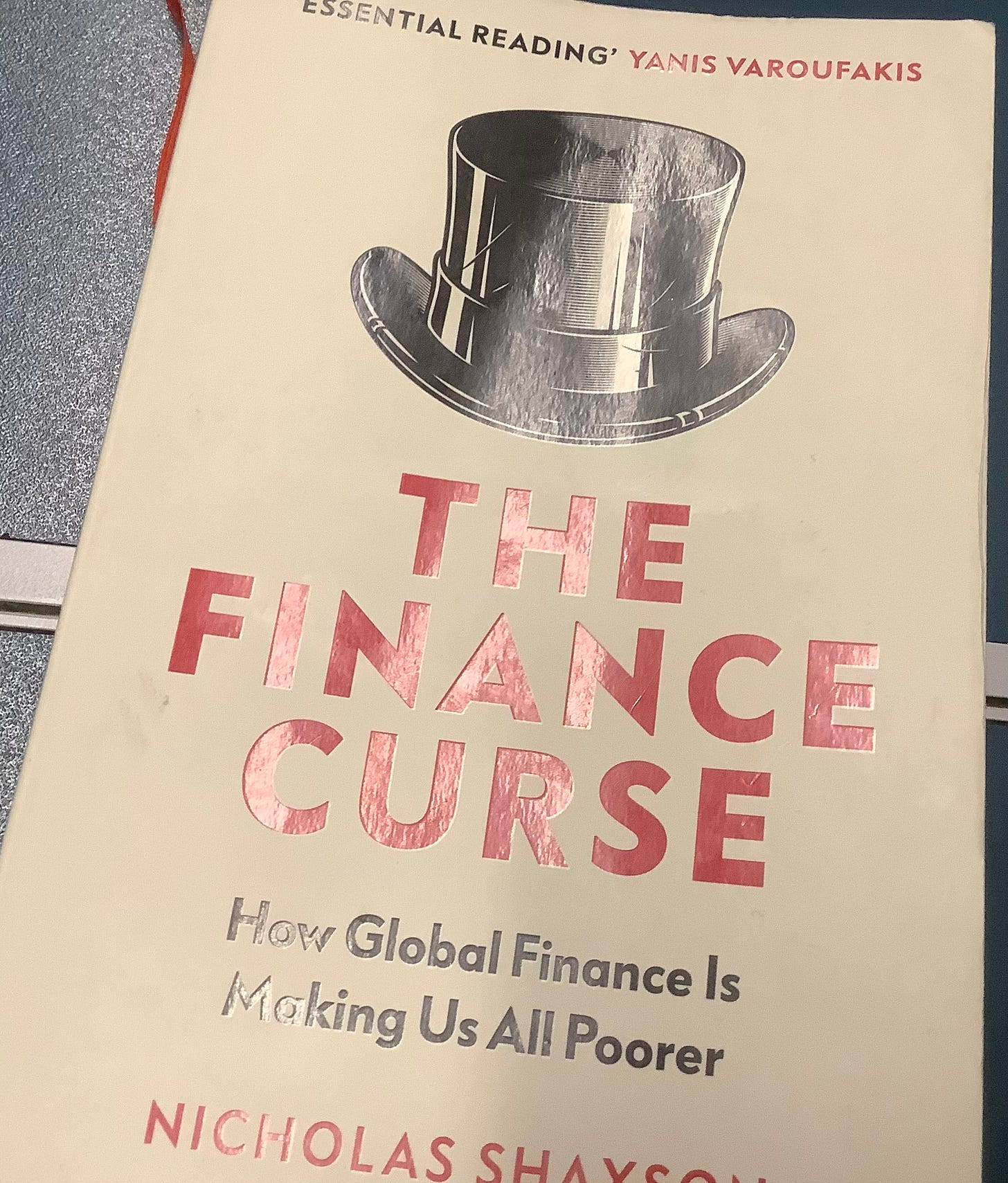I read The Finance Curse a while ago but have only just got round to constructing a review. The book, by Nicholas Shaxson, was published in 2018, and is about the effects of an over-developed finance sector on the British economy. As you read it, you realise also that it explains the political economy of the United Kingdom. (I’m told that something similar happens with Oliver Bullough’s two books on the same theme—Moneyland and Butler to the World—but I haven’t read these.) This review is on the long side, by the way.
By political economy, I mean that it describes the workings of the UK in a way that makes otherwise apparently irrational political decisions make sense, at least on their own terms.

(Photo: Andrew Curry. CC BY-NC-SA 4.0)
Bloated finance sector
In short, the book suggests that the UK economy has a financial sector that is about significantly larger than it needs to be to service the productive parts of the economy, and the effects of this are almost completely extractive.
The history is striking. Until 1970, the UK’s finance sector’s assets were worth about 50% of UK GDP. By 2007, this had reached 500%—around twice the average for Europe, four or five times the ratio for the United States.
The result is that the City of London, in effect, is a leech that sits on the economy and takes a cut wherever it can. And second, public policy decisions and public institutions routinely privilege this behaviour.
Finance-driven policy
To take one example (this is mine not his): one of the reasons that the UK opted for an unwieldy student loan scheme to pump money into the university sector, rather than a simpler and cleaner graduate tax, is because it creates a loan book that needs servicing.
Or, come to that, why Britain implements a complicated and unhelpful ‘loan’ on behalf of its energy companies while France merely slaps a windfall tax on excess profits.
I realise that this story is almost the exact opposite of the one that is usually told about the City of London. If I had a tenner for every story I’ve read from some City flack about how the City of London props up the British economy because of the taxes that it pays, I would probably be writing this on the verandah of my place in the Cayman Islands.
Lobbying’s one stop shop
Shaxson reminds us of all of this noise, and also reminds us that it is now completeely institutionalised. After the financial crisis, the then Chancellor of the Exchequer (UK Finance Minister) Alistair Darling and the Treasury set up TheCityUK, in the face of public anger about the role the banks had played in the crisis, and how little they had been affected by this. Although created by the government, it was run by the City of London Corporation, as—in Shaxson’s words, “a one stop shot for financial lobbying (p258).”
This closeness goes back a long way: the City of London also an official—“the remembrancer”—who has the right to sit on the floor of the House of Commons in the eyeline of the Speaker of the House, to keep an eye on things. The history of how the City of London came to be a facilitator of offshore finance—which largely sits behind this story—is about a deliberate act of policy promoted by the Treasury to offset the relative decline in London’s importance after the war.
So it’s probably worth backing up a bit.
The finance curse and the oil curse
The idea of the “finance curse” is a metaphor taken from another metaphor, that of the “oil curse”. The “oil curse” is the observation that most economies that have discovered oil have been wrecked by it—with the notable exception of Norway. (That’s a post for another day). This is counter-intuitive, since finding oil historically has basically been like finding free money in a hole in the ground.
Shaxson, who worked as a reporter in Angola during its oil boom, says it works like this:
their natural resource abundance seemed to result in slower economic growth, more corruption, more conflict, more authoritarian politics and greater poverty than their resource-poor peers… The big point is that all of this money flowing from their natural resource endowments can make their populations even worse off than if the riches had never been discovered (p5).
So, similarly, the finance curse. Financial sectors do have a function in a well-ordered economy: they channel investment towards more productive activities, they spread risk, and so on.
Extracting value
But when they are over-blown—and the UK finance sector is vastly over-blown, given the size of the economy—they start to become self-serving. They need to extract value to maintain themselves:
Once a finance sector grows above an optimal size, and beyond its useful roles, it begins to harm the country that hosts it. Finance turns away from its traditional role service society and creating wealth, and towards often more profitable activities to extract wealth from other parts of the economy. It also becomes politically powerful, shaping laws and rules and even society to suit it. The results include lower economic growth, steeper inequality, inefficient markets, damage to public services, worse corruption, the hollowing out of alternative economic sectors, and widespread damage to society and democracy.
Well, for anyone who follows the state of the UK, that seems like a pretty familiar list.
One of the strong claims in the book is that the usual rhetoric about the City of London (noisily promoted by the City) is that it subsidises the rest of the UK. Shaxson suggests that this isn’t the case: that much of this apparent wealth is merely extracted from the rest of the UK and packaged up as profits.

(The City of London, sticking it to the rest of us. Photo by kloniwotski/flickr, CC BY-SA 2.0)
The invention of PFI
Shaxson starts his explanation of how this process works in practice with an example from the Private Finance Initiative, an invention of John Major’s 1990s government that was hugely expanded by New Labour in the early 2000s. PFI was designed to invest in (much-needed) public infrastructure while keeping the costs off the public sector balance sheet.
(Why it was necessary to do this has never been clear to me: governments don’t get punished by the markets for capital investment, they get punished when current expenditure outruns revenues. But one of the features of a dominant idea about political economy is that it presents itself as both necessary and as common sense, even when it isn’t).
‘One for the price of two’
Shaxson has found a striking example of PFI: the Strathclyde Police Training and Recruitment Centre, in East Kilbride. It cost £17 million to build, and the PFI consortium that built it will be paid £112 million for this between 2001 and 2026. The consortium itself is structured in a labyrinthine way—it’s Special Purpose Vehicles, etc etc, all the way down—to minimise tax exposure.
If the government had issued a 25-year bond to pay for this at (a generous) 5% per year, it would have cost £37 million. Not all of the £75 million difference is free money, but most of it is. Allyson Pollock, who has researched PFI in the health sector, decribes it as “a way of getting one hospital for the price of two” (p 223).
Decaying infrastructure
This isn’t a special case. The best estimate of the asset value of buildings constructed in the UK through PFI is £59 billion. The cost of financing them? £306 billion. It’s not surprising that the UK has have a decaying public infrastructure, in comparison to, say, north European neighbours.
One of the results of all of this is that money that should have come from our taxes to pay for better services and so on is being channelled to the kinds of people who have investments (so more affluent than average1), who are more likely to live in the south of England, if they live in the UK at all, and some of it will end up offshore.
Private equity and outsourcing
It’s not just about PFI, of course. When a private equity operator takes over a business, loads it with debt to pay for the transaction, and then slashes costs to pay itself the interest payments on the debt, pretty much exactly the same thing happens: productive businesses that are viable become machines for feeding the financial sector. Huge chunks of the British retail sector are run like this now, much of the elder care sector, even Manchester Utd.
The same thing also happens when public services are outsourced to the private sector.
Outsourcing was supposed to drive down costs by introducing competition into areas dominated by a stodgy state. But the result has been to create a few large monopolistic providers like Serco, Atos, Capita, and the now-collapsed Carillion, which specialise not in providing the most competitive services but in winning government contracts and maximising their own revenues (p 232).
Large monopolies—especially ones driven by financial ratios—accelerate all of the processes here. Stock buybacks—which have accelerated in recent years—are another form of financialisation that extracts money from businesses and channels it into the financial sector.
The cost of the damage
Shaxson and a research colleague, John Christensen, asked the American academics Gerald Epstein and Juan Montecino to replicate for the UK some analysis they had done on the US on the net costs of high finance on the British economy. Their conclusion: conservatively, the cost of the damage done to the UK by an outsized finance sector over the period 1995-2015 is around £4.5 trillion—which represents two and a half years of British economic output, or around £8,000 per household per year.
Sitting right there might be an explanation of the UK’s productivity ‘crisis’, which sees UK productivity sit 15-25% below the rest of northern Europe. It’s worth noting that research and development and forms of retained knowledge are often sheared off in these financialised models.
Policy implications
So there are some pretty obvious policy points here.
The most obvious one is that the so-called ‘Preston model’ makes complete sense as a way of not having local resources and value chains sucked away to the City. It focuses on “community wealth building’, investment in productive economic activity, and re-invests locally the benefits of local economic growth.
The second is that regional authorities and devolved nations should do some of their own local calculations about their share of the £4.5 trillion—because there is political value in over-turning the notion of the benficent City bailing out the needy regions. We need new stories here. If I were the Scottish government, I might also re-run some of those calculations about a post-independence Scottish economy.
A different vision
The third is that we should be creating a vision of what Britain might look like without this vast weight of money leaching, or leeching, out to the finance sector. If nothing else, think what all of those physicists and engineers might be doing—on climate change, say—if they weren’t employed inventing ever more complex financial extraction schemes.
Shaxson has some thoughts of his own. These include: doubling down on the battle against tax havens; ensuring transparency of property assets; ‘smart capital controls’, to discourage the wrong kind of finance coming into the UK; and some serious anti-monopoly policy.
Even just naming the process, and the price that we all pay for it, might start to make a difference.





